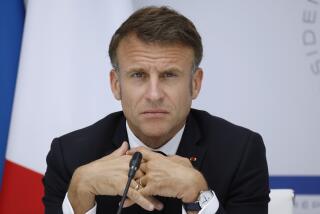European finance ministers vow to tackle debt crisis
- Share via
Reporting from London — European finance officials pledged Tuesday to tackle their region’s worrisome budget deficits as beleaguered Greece began tapping into billions of dollars in loans from its neighbors to stay afloat.
Meeting in Brussels, finance ministers from the 27 European Union countries said curbing public spending must be their No. 1 task amid increasing alarm over the stability of the euro, which has dropped precipitously in value during the last few weeks.
“It’s now very important to reinforce confidence in the European economy,” said Olli Rehn, the EU’s commissioner for monetary and economic affairs. “It is essential now that we show that we are serious about fiscal consolidation.”
His comments came as Athens took out its first loan installment from a rescue package now valued at $136 billion. The fund was approved this month by the 16 countries that use the currency and the International Monetary Fund.
The Greek Ministry of Finance announced that it was borrowing about $18 billion from its Eurozone neighbors, the other 15 nations that have adopted the euro. That loan came on top of nearly $7 billion provided by the IMF last week. Germany, the Eurozone country most resistant to the idea of a bailout, was the biggest lender Tuesday, handing over about $5.4 billion.
The money was a lifeline for Greece, which faced about $11 billion in debt coming due Wednesday. Athens said the loans were sufficient to cover its “immediate and short-term financing needs.”
The Mediterranean nation’s parlous public finances lighted the spark that ignited the current euro debt crisis, which has since spread to other parts of Europe. Continued anxiety over the currency’s health drove it down to a four-year low against the dollar during trading Monday.
On Tuesday, some investor jitters seemed to have subsided, at least temporarily, and the main European bourses closed up.
Concern over government deficits has grown especially acute with regard to Spain and Portugal. Fear that bigger economies than Greece’s might default led the Eurozone, in conjunction with the IMF, to establish a trillion-dollar rescue mechanism a little over a week ago for member states in trouble.
Both Spain and Portugal unveiled new austerity measures last week to assure investors of their determination to reduce public spending, despite warnings from some economists that the cuts could push the countries back into recession.
“Every time you do some cuts in your budget, it’s possible to have a small contraction in the economy, but we think at this moment the balance has to be on the fiscal-consolidation side,” said Elena Salgado, the Spanish finance minister.
At the Brussels meeting, the EU finance ministers also agreed to toughen rules governing hedge funds, which many in Europe blame for contributing to the global financial crisis.
Britain, however, objected out of concern that heavier regulation would encourage financial institutions and companies to pull up stakes from London, the hub of European finance, in favor of a non-EU country in the region such as Switzerland.
The decision was a defeat for Britain’s Conservative-led coalition government, which is less than a week old.
More to Read
Sign up for Essential California
The most important California stories and recommendations in your inbox every morning.
You may occasionally receive promotional content from the Los Angeles Times.














